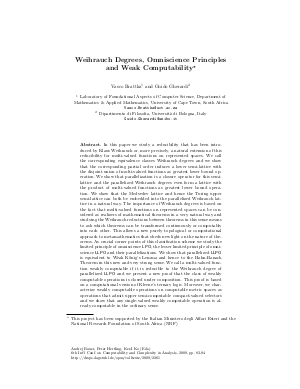Weihrauch Degrees, Omniscience Principles and Weak Computability
Authors Vasco Brattka, Guido Gherardi
-
Part of:
Volume:
6th International Conference on Computability and Complexity in Analysis (CCA'09) (CCA 2009)
Part of: Series: Open Access Series in Informatics (OASIcs) - License:
 Creative Commons Attribution-NonCommercial-NoDerivs 3.0 Unported license
Creative Commons Attribution-NonCommercial-NoDerivs 3.0 Unported license
- Publication Date: 2009-11-25
File

PDF
OASIcs.CCA.2009.2261.pdf
- Filesize: 327 kB
- 12 pages
Document Identifiers
Subject Classification
Keywords
- Computable analysis
- constructive analysis
- reverse mathematics
- effective descriptive set theory
Metrics
- Access Statistics
-
Total Accesses (updated on a weekly basis)
0PDF Downloads0Metadata Views
Abstract
In this paper we study a reducibility that has been introduced by Klaus Weihrauch or, more precisely, a natural extension of this reducibility for multi-valued functions on represented spaces. We call the corresponding equivalence classes Weihrauch degrees and we show that the corresponding partial order induces a lower semi-lattice with the disjoint union of multi-valued functions as greatest lower bound operation. We show that parallelization is a closure operator for this semi-lattice and the parallelized Weihrauch degrees even form a lattice with the product of multi-valued functions as greatest lower bound operation. We show that the Medvedev lattice and hence the Turing upper semi-lattice can both be embedded into the parallelized Weihrauch lattice in a natural way. The importance of Weihrauch degrees is based on the fact that multi-valued functions on represented spaces can be considered as realizers of mathematical theorems in a very natural way and studying the Weihrauch reductions between theorems in this sense means to ask which theorems can be transformed continuously or computably into each other. This allows a new purely topological or computational approach to metamathematics that sheds new light on the nature of theorems. As crucial corner points of this classification scheme we study the limited principle of omniscience $\LPO$, the lesser limited principle of omniscience $\LLPO$ and their parallelizations. We show that parallelized $\LLPO$ is equivalent to Weak König's Lemma and hence to the Hahn-Banach Theorem in this new and very strong sense. We call a multi-valued function weakly computable if it is reducible to the Weihrauch degree of parallelized $\LLPO$ and we present a new proof that the class of weakly computable operations is closed under composition. This proof is based on a computational version of Kleene's ternary logic. Moreover, we characterize weakly computable operations on computable metric spaces as operations that admit upper semi-computable compact-valued selectors and we show that any single-valued weakly computable operation is already computable in the ordinary sense.
Cite As Get BibTex
Vasco Brattka and Guido Gherardi. Weihrauch Degrees, Omniscience Principles and Weak Computability. In 6th International Conference on Computability and Complexity in Analysis (CCA'09). Open Access Series in Informatics (OASIcs), Volume 11, pp. 83-94, Schloss Dagstuhl – Leibniz-Zentrum für Informatik (2009)
https://doi.org/10.4230/OASIcs.CCA.2009.2261
BibTex
@InProceedings{brattka_et_al:OASIcs.CCA.2009.2261,
author = {Brattka, Vasco and Gherardi, Guido},
title = {{Weihrauch Degrees, Omniscience Principles and Weak Computability}},
booktitle = {6th International Conference on Computability and Complexity in Analysis (CCA'09)},
pages = {83--94},
series = {Open Access Series in Informatics (OASIcs)},
ISBN = {978-3-939897-12-5},
ISSN = {2190-6807},
year = {2009},
volume = {11},
editor = {Bauer, Andrej and Hertling, Peter and Ko, Ker-I},
publisher = {Schloss Dagstuhl -- Leibniz-Zentrum f{\"u}r Informatik},
address = {Dagstuhl, Germany},
URL = {https://drops.dagstuhl.de/entities/document/10.4230/OASIcs.CCA.2009.2261},
URN = {urn:nbn:de:0030-drops-22617},
doi = {10.4230/OASIcs.CCA.2009.2261},
annote = {Keywords: Computable analysis, constructive analysis, reverse mathematics, effective descriptive set theory}
}
